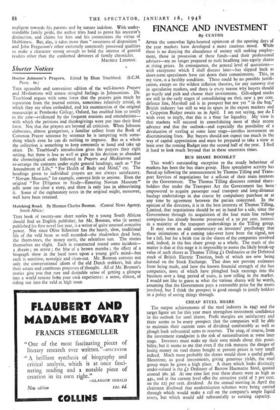FINANCE AND INVESTMENT
By CUSTOS
AFTER the somewhat light-hearted optimism of the opening days of the year markets have developed a more cautious mood. While there is no denying the abundance of money still seeking employ- ment, those in possession of these funds—and their professional advisers—are no longer prepared to rush headlong into equity shares at rising prices. In consequence, the general level of quotations— with exceptions which I shall discuss later—has slipped back as short-term speculators have cut down their commitments. This, in my view, is a healthy condition. There could be no possible justifi- cation, except on the wildest inflation theories, for any runaway rise in speculative markets, and there is evtry reason why buyers should go warily and pick and choose their investments. Gilt-edged stocks are still in the early stages of consolidating on their new 3 per cent. defence line, Marshall aid is in prospect but not yet " in the bag," British industry has still to win its spurs in the export markets and a Crippsian Budget awaits us in April. I am not saying, nor do I wish even to imply, that this is a -lime for liquidity. My' view is that markets will succeed in consolidating most of their recent advance and that the outlook—and especially the possibility of a devaluation of sterling at some later stage—justifies investment on discriminating lines. But buyers should,not expect too much in the way of capital appreciation and must be prepared to take a view at least over the corning Budget into the second half of the year. I find it hard to look much beyond that in these uncertain times.
BUS SHARE BOOMLET This week's outstanding exception to the steady behaviour of markets has been the bus share group. Here speculative activity has flared up following the announcement by Thomas Tilling and Trans- port Services of negotiations for a sell-out of their main interests to the Government. The Thomas Tilling directors remind share- holders that under the Transport Act the Government has been • empowered to acquire passenger road transport and long-distance haulage undertakings in due course by compulsory purchase or at any time by agreement between the parties concerned. In the opinion of the directors, it is in the best interests of Thomas Tilling, Limited, that negotiations should be set in hand for a sale, since the Government through its acquisition of the four main line railway companies has already become possessed of a 5o per cent. interest in a majority of the transport undertakings in the Tilling group. It may seem an odd conunentary on investors' psychology that these intimations of a coming take-over have been the signal, not for a fall, but for a brisk rise in the shares of the companies involved and, indeed, in the bus share group as a whole. The truth of the matter is that at this stage it is impossible to assess the likely break-up value of such shares as Thomas Tilling Li Ordinaries or the Deferred stock of British Electric Traction, both of which are now being hoisted on the Stock Exchange. That does not prevent estimates from being made, and here the known financial strength of the bus companies, most of which have ploughed back earnings into the business over a long period of years, is now telling in the market. I would not like to guess at what the various shares will be worth, assuming that the Government pays a reasonable price for the assets involved, but I think the prospect is good enough to justify holders in a policy of seeing things through.
CHEAP STEEL SHARE
The output achievements of the steel industry in 1947 and the target figure set for, this year must strengthen investment confidence in the outlook for -steel shares. Profit margins are satisfactory and there seems to be every prospect that the companies will be able to maintain their current rates of dividend comfortably as well as plough back substantial sums to reserves. The snag, of course, from the investment standpoint is the risk of nationalisation at some later stage. Investors must make up their own minds about this possi- bility, but it seems to me that even if the risk matures the danger of losing money on steel shares bought at present prices is very small indeed. Much more probably the shares would show a useful profit. Meantime, as good investments, giving generous yields, the steel group must be given a high place. A share which looks distinctly under-valued is the LI Ordinary of Barrow Haematite Steel, quoted around 36s. 3d. At one time last year these shares were as high as 44s., and at the current level offer the attractive yield of 7 per cent. on the I21 per cent. dividend. At the annual meeting in April the chairman disclosed that modernisation schemes were being carried through which would make a call on the company's ample liquid assets, but which would add substantially to earning capacity.


































 Previous page
Previous page